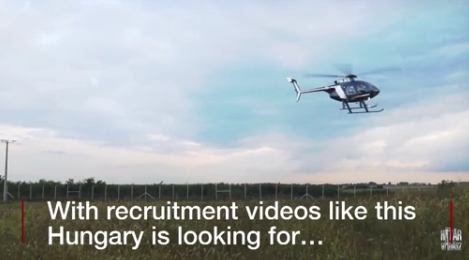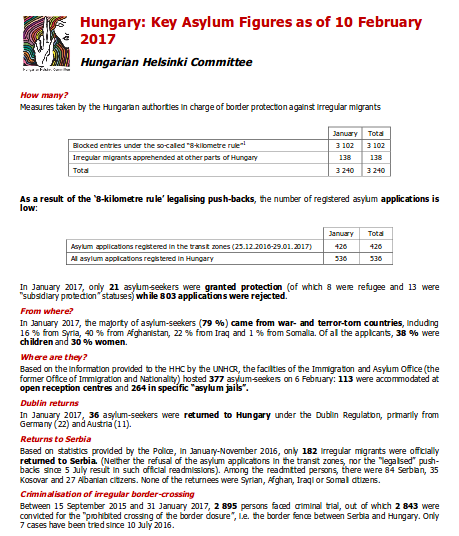Hungary will not accept any refugee sent by other European Union countries, a minister in charge of the Hungarian Prime Ministry said late Tuesday. „Western European countries, especially Germany and Sweden, want to send about 30,000 migrants back to Hungary. We will not accept them,“ Janos Lazar told reporters during a conference in Budapest.
Alle Beiträge von ms
Doppelt hält besser: Ungarn baut zweiten Zaun, EU schaut zu
Das Helsinki Komitee beim Europarat sowie die NGO Human Rights Watch üben nicht nur Kritik an der Verschärfung von Grenzregime und dem Umgang mit Flüchtlingen in Ungarn, sondern auch an der Untätigkeit der EU, gegen die Quasi-Aufhebung des Asylrechtes vorzugehen. Die Regierung in Budapest beeindruckt nichts, sie baut nun den zweiten Zaun zu Serbien, der so „intelligent“ sein soll, dass keiner ihn mehr überwinden kann.
Ungarns Regierung macht Politik mit Verschwörungstheorien
Als Währungsspekulant hat George Soros Milliarden verdient. Geld, das er seit Jahrzehnten auch in humanitäre Hilfsorganisationen investiert. In Ungarn helfen sie Bürgern und Flüchtlingen, ihre Rechte wahrzunehmen. Der Regierung Orban ist das ein Dorn im Auge. Soros dient als Feindbild. Vielen europäischen Rechtspopulisten und Rechtsextremen gilt er als Inbegriff einer angeblichen jüdischen Verschwörung, auch in Deutschland. Die Folge in Ungarn: Soros-Hilfsorganisationen werden massiv bedroht – von der Regierung und der regierenden Fidesz.
MIGSZOL: Testimonies of border violence
Here we collect material on the ongoing violence at the Southern border of Hungary. We publish testimonies, analysis and reports about actions against it.
Stellungnahme des HHC: Hungary – Government’s New Asylum Bill on Collective Push-backs and Automatic Detention
The most concerning changes include:
- The grounds on which the Government may order a ‘state of crisis due to mass migration’ are extended to include vaguely defined requirements [Bill, Article 6].
- The Government plans to extend the existing state of crisis by a further 6 months, it has announced, until 7 September 2017.
- If any foreigner who has no right to stay in Hungary is apprehended anywhere in the country, s/he shall be “escorted” back by the police to the external side of the border fence along the southern border. Migrants affected by this push-back measure will not be given access to seek asylum or to challenge their removal from the country, an action that makes the otherwise prohibited collective expulsion the norm, and breaches the EU Returns Directive. No registration or individual documentation of persons “escorted” back across the fence is carried out, neither are their protection needs assessed [Bill, Article 7].
- Asylum applications can only be submitted in person within the transit zones [Bill, Article 7]. This proposal is especially problematic and worrying as since 23 January 2017 the number of admitted asylum seekers to each of the now operational two transit zones along the Serbian border has been reduced to 5-5 persons per working day.
- All those who are accomodated at open reception facilities or detained in asylum or immigration detention facilities at the time the bill enters into force will be transferred to the transit zones [Bill, Articles 3, 4 and 9].
- All asylum-seekers, including all vulnerable persons and unaccompanied asylum-seeking children over 14 years of age, will be detained in the transit zones [Bill, Articles 4, 7 and 9]. The detention of unaccompanied minor children between the age of 14-18 years is clearly against the best interest of the child and breaches human rights and EU law.
- The placement of asylum-seekers in the transit zones is “effectively detention”, as even the Government admits it in the reasoning of the Bill [General reasoning, para. 4]. However, no detention order would be issued and consequently no legal remedy would be available against the detention. The current maximum 28 days of stay in the transit zone would be eliminated, rendering the de facto detention of asylum seekers indefinite [Bill, Article 12].
- The deadline to seek judicial review of inadmissibility decisions and rejections of asylum applications would be drastically shortened to 3 days, hindering the applicant’s ability to challenge these decisions in court [Bill, Article 7].
- Judicial clerks, who are not appointed fully qualified judges, would also be involved in making court decisions in the asylum procedure [Bill, Article 6].
- Personal interviews in the judicial review of asylum decisions could be carried out remotely via telecommunication devices [Bill, Article 6].
- Asylum seekers in the transit zones would be obliged to cover the costs of their detention unless they are granted protection status [Bill, Article 3].
BBC: Hungary recruiting ‚border-hunters‘
Hungary: Government’s New Asylum Bill on Collective Push-backs and Automatic Detention
Aus der Stellungnahme des ungarischen Helsinki Komitees:
The most concerning changes include:
- The grounds on which the Government may order a ‘state of crisis due to mass migration’ are extended to include vaguely defined requirements [Bill, Article 6].
- The Government plans to extend the existing state of crisis by a further 6 months, it has announced, until 7 September 2017.
- If any foreigner who has no right to stay in Hungary is apprehended anywhere in the country, s/he shall be “escorted” back by the police to the external side of the border fence along the southern border. Migrants affected by this push-back measure will not be given access to seek asylum or to challenge their removal from the country, an action that makes the otherwise prohibited collective expulsion the norm, and breaches the EU Returns Directive. No registration or individual documentation of persons “escorted” back across the fence is carried out, neither are their protection needs assessed [Bill, Article 7].
- Asylum applications can only be submitted in person within the transit zones [Bill, Article 7]. This proposal is especially problematic and worrying as since 23 January 2017 the number of admitted asylum seekers to each of the now operational two transit zones along the Serbian border has been reduced to 5-5 persons per working day.
- All those who are accomodated at open reception facilities or detained in asylum or immigration detention facilities at the time the bill enters into force will be transferred to the transit zones [Bill, Articles 3, 4 and 9].
- All asylum-seekers, including all vulnerable persons and unaccompanied asylum-seeking children over 14 years of age, will be detained in the transit zones [Bill, Articles 4, 7 and 9]. The detention of unaccompanied minor children between the age of 14-18 years is clearly against the best interest of the child and breaches human rights and EU law.
- The placement of asylum-seekers in the transit zones is “effectively detention”, as even the Government admits it in the reasoning of the Bill [General reasoning, para. 4]. However, no detention order would be issued and consequently no legal remedy would be available against the detention. The current maximum 28 days of stay in the transit zone would be eliminated, rendering the de facto detention of asylum seekers indefinite [Bill, Article 12].
- The deadline to seek judicial review of inadmissibility decisions and rejections of asylum applications would be drastically shortened to 3 days, hindering the applicant’s ability to challenge these decisions in court [Bill, Article 7].
- Judicial clerks, who are not appointed fully qualified judges, would also be involved in making court decisions in the asylum procedure [Bill, Article 6].
- Personal interviews in the judicial review of asylum decisions could be carried out remotely via telecommunication devices [Bill, Article 6].
- Asylum seekers in the transit zones would be obliged to cover the costs of their detention unless they are granted protection status [Bill, Article 3].
Hungary: Key Asylum Figures as of 10 February 201 7
Ungarische Regierung: Strategic Cabinet decides on amendments to detain immigrants
“The presence of immigrants in Hungary represents a security risk, and accordingly the Government has decided that their free movement must be restricted”, the Minister of the Prime Minister’s Office and the region’s Member of Parliament said at a public forum before a crowd of some two hundred. “In future, people who submit requests must wait at the border for a decision to be made concerning their request. This is currently not the case; migrants are allocated to open camps for the duration of the judicial review or after a period of four weeks has elapsed”, the Minister explained. “People who are currently present within the territory of Hungary – their numbers are estimated at six-eight hundred– will be transported back to the border in several stages”, he said.
Ungarische Regierung: Border protection base of Hungarian Defence Forces completed in Kelebia
Speaking at a press conference held in Kelebia, Bács-Kiskun County, Chief of Defence Gen. Dr. Tibor Benkő announced that the Kelebia border protection base of the Hungarian Defence Forces has been completed, and the installations at Bácsalmás, Madaras and Hercegszántó are expected to be finished by the spring. These facilities will provide modern field accommodation for altogether 600 men.



